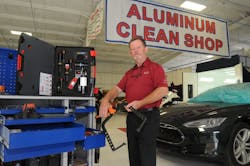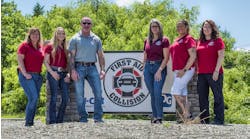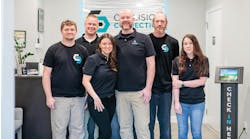Many of his friends and colleagues say Tommy Suggs can see into the future.
An industry lifer who grew up working with his father in shops, Suggs always seems one step ahead of the rest of the industry, capitalizing on trends not yet widely known or understood by the majority of shops.
His strategy is simple, really: Study and learn from the past, stay observant, make adjustments, continually improve and plan in the present; and then the future takes care of itself.
Suggs’ past includes building a Georgia powerhouse shop over the course of 30 years, and being one of the early adopters of a numbers-focused business model dedicated to eliminating waste. The shop fetched a large sum from a national retailer in 2002.
And his present? After seeing a glaring opportunity in the industry, he opened European Collision Repair in 2006—a shop that would build its business off referrals from OEM certification programs, working almost exclusively on high-end vehicles. He built an aluminum clean room to join the Mercedes-Benz program in 2008. He started gaining more certifications, including one from Tesla, and added a 10,000-square-foot, aluminum-only building across the street from his original 16,000-square-foot facility in Jonesboro, Ga.
Location: Jonesboro, Ga.
Main Facility size: 16,000 square feet,
Clean Building size: 10,000 square feet
Staff Size: 16
Monthly Car Count: 73 (total); 20 (aluminum)
Annual Revenue: $2.8 million
Now, Suggs’ future includes expanding his $2.8 million business even further, sticking to aluminum as his key differentiator. In August, Suggs will open two new locations, both 12,000 square feet, that will work exclusively on aluminum repair.
“I’ve seen aluminum and the push on certifications coming for a long time,” Suggs says. “This past year really just confirms my thoughts.”
“Aluminum is the future,” he adds, and his business is all in.
A High-End History
Suggs’ businesses have always had a focus on higher-end vehicles. And that history of working with Mercedes and other European makers for decades gave Suggs the luxury of being slowly introduced to the use of aluminum paneling. He and his staff were able to learn the processes, making them more prepared for when the use of aluminum expanded more mainstream in 2008 with the Mercedes S Class.
“We didn't know what we were doing when we did it,” Suggs says of his first foray into aluminum decades ago. “We shared ideas with other shops that were doing it and started putting it together.”
European Collision joined the Mercedes program and built a clean room, and the business grew quickly.
In its first year, the business generated $600,000 in sales. In 2013, it did $2.8 million, and in 2014, the original shop is on pace to cruise past $3 million.
The introduction of Tesla’s Model S was a turning point. Based on their history and experience, European Collision was selected as a potential part of the Tesla body shop program. Suggs jumped at the opportunity and became one of the first Tesla-certified shops in the country in October 2013. He dominated his area’s market share, and the workflow demanded an entire clean building.
“There aren’t going to be very many shops that are going to be asked to take part in what’s happening, and not many of them are qualified to take part in it,” Suggs says. “I see a wonderful thing for our industry, for the good shops that have had to fight the insurance companies over the years.”
Making the Investment
Finding his way into a high-end aluminum repair business didn’t happen by chance, Suggs says, nor should any jump be made without serious considerations.
One key factor, according to Suggs, is knowing whether the local market potential for these types of vehicles could offset the costs of equipment and training needed to work on them.
“You need to look at the cars that are there: Are there enough aluminum cars in that area?” Suggs says. “And then: Do I have a technician that is intelligent enough to learn how to repair aluminum and electric cars and worth the cost to become certified?”
Suggs says to study nearby dealerships and look at their sales of aluminum-bodied vehicles. Then, gauge the local competition. Both the demand for the work and the market saturation of shops able to do the repairs will have a direct effect on your possible return.
With a Tesla sales center nearby, and no one else in his area equipped for the work, Suggs saw the market as ripe for the picking.
He estimates that his shop spent nearly $300,000 on equipment and training for the all-aluminum building he purchased across the street from his original shop. That price includes additional speciality equipment, tools and certification fees specifically for the Tesla program.
Suggs says the cost is necessary to get the structural parts from Tesla as well as to do the repairs to the manufacturer’s safety specifications.
Other key considerations include shop space and the cost of all the new equipment for a clean room. That includes $10,000 vacuums and a complete set of new and specialized tools even if a shop isn’t shooting for a Tesla certification.
Finding the right technician for this type of work can be difficult, Suggs says. This spring, he hired a pair of techs in their mid-20s with the expectation that they would become Tesla certified.
Lead technician Bruce Shoemaker has spent equal time in the service and collision industries, and he’s accustomed to following exact specifications. He was the first tech at the shop to be certified in Tesla’s program.
With Tesla’s unique adhesive bonding process for paneling and structure components, Shoemaker says it takes a combination of speed and patience.
“You have to hope that what you did is correct, because you get no second chances,” Shoemaker says. “If you mess up, you mess up the additional panels you’re connecting to. So it has to be right. You have to take the time and effort to make sure the lines and fit are right.”
While Shoemaker’s experience has helped, he says technicians with an aptitude to learn are often the most successful in getting through the Tesla-certification courses.
“It’s directly related to attitude and being trained in the past,” Shoemaker says. “There is definitely the need to be open minded and able to learn.”
Continuing Growth
Suggs hopes for continued growth with additional certifications with Volkswagen and Audi. Tesla is only growing, and with the introduction of aluminum-bodied vehicles from domestic automakers (the 2015 Ford F-150, in particular), Suggs sees even more opportunity.
That’s where the two new facilities come in.
One will be in Nashville, Tenn.; the other in Sandy Springs, Ga. Both are within a couple miles from Tesla service centers.
And that’s no accident. Tesla worked with Suggs in positioning the facilities, and he’s planning on each opening with one body tech, one painter, one detailer and one manager to start. The team will focus primarily on Tesla-referred work, while slowly building out with other OEM aluminum work.
Each facility will cost Suggs roughly $200,000 for equipment, tools, training and certification fees to be fully operational. The staff will have already completed its training by the time the doors open.
“It’s going to be a pretty good investment,” Suggs says about being a Tesla shop. “When you look at the return, it’s a breath of fresh air for our industry to see something there that can’t be controlled by the insurance companies. It’s not anybody that can go buy a part for a Tesla.”
The return is quick, Suggs says, compared with a traditional shop, because of the high ticket price on Tesla work.
Each job, he says, brings in at least twice the revenue of a comparable job on a steel-bodied vehicle, and that’s at a minimum.
He expects both shops to be cashflow positive within a year, based on the projections of his current 10,000-square-foot aluminum building. At their peak, the shops will have three body techs, and the rest of the staff will be similar to what it is at opening.
Advantages to Being Early
With the Aluminum repair market still in its early stages, Suggs has taken the initiative to help educate customers and insurance companies through clinics hosted at his shop.
Featuring representatives from Tesla and other manufacturers, the clinics share valuable information about the serious need for proper repairs and the risks of cars going to shops that aren’t equipped to make all-important structural fixes.
Future success, Suggs says, is going to be for those shops that are able to position themselves as experts in the latest vehicle technology. Position yourself accordingly, he says, and the future is bright.
“This is an exciting time for the industry,” he says. “I hope people can look around and see that, and can jump on this bandwagon, because it’s going in the direction we need to go.”




